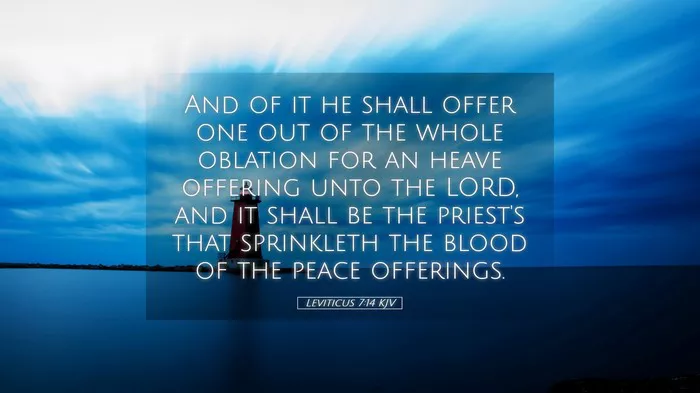Read the Daily Bible Verse – Leviticus 7:14 To Strengthen Your Spiritual Journey.
The Context of Leviticus 7:14 KJV
The book of Leviticus is a part of the Pentateuch, written by Moses. It provides instructions to the Israelites on how to live holy lives and worship God. The seventh chapter of Leviticus discusses the rules for offerings, specifically peace offerings, which signify communion and fellowship with God. These offerings were categorized into thank offerings, vow offerings, and freewill offerings, each with specific guidelines.
Leviticus 7:14 is a verse within this chapter that highlights the portion of the offering reserved for the priests, symbolizing a shared fellowship between God, the priests, and the people.
Leviticus 7:14 (KJV)
“And of it he shall offer one out of the whole oblation for an heave offering unto the Lord, and it shall be the priest’s that sprinkleth the blood of the peace offerings.”
This verse specifically outlines the role of the priest in receiving a portion of the offering. It ensures provision for the priests, who serve in God’s tabernacle, and it also sanctifies the act of worship.
Leviticus 7:14 Meaning
1. The Heave Offering
The term “heave offering” refers to a portion of the sacrifice that is lifted or “heaved” upward, signifying its dedication to God. By lifting it, the worshipper acknowledges that the offering belongs to God and is given in gratitude and reverence.
2. One Out of the Whole Oblation
This portion signifies that while the entire offering is holy, a specific part is set aside for the priests. It underscores the principle of sharing blessings with those who serve God full-time.
3. Priestly Provision
The priests relied on offerings for their sustenance. By allowing them to partake in a portion of the sacrifice, God demonstrated His provision for those dedicated to ministry.
4. Symbolism of Peace Offerings
Peace offerings symbolize restored relationships and fellowship with God. The inclusion of the priests in the offering demonstrates the interconnectedness of worshippers and spiritual leaders in communal worship.
5. The Role of the Blood
The priest who sprinkles the blood of the offering is singled out to receive this portion. This act of sprinkling blood signifies atonement and purification, pointing forward to the ultimate sacrifice of Christ.
Leviticus 7:14 Application in Life
1. Gratitude to God
The heave offering reminds Christians to dedicate a portion of their blessings to God. This could manifest as tithes, offerings, or acts of service, expressing gratitude for His provision.
2. Support for Spiritual Leaders
The principle of sharing offerings with the priests emphasizes the importance of supporting those who minister spiritually. In the modern context, this could involve financial and emotional support for pastors, missionaries, and church workers.
3. Fellowship with God and Others
The peace offering’s communal nature encourages Christians to seek harmonious relationships with God and others. It serves as a reminder to live in unity and peace within the body of Christ.
4. Christ as the Fulfillment
The priestly role in sprinkling blood foreshadows Christ, the ultimate High Priest, who shed His blood for the atonement of humanity. Christians can draw strength from this truth, knowing their peace with God is secured through Jesus.
5. Faithful Stewardship
By setting aside a portion for God and His servants, believers practice faithful stewardship of their resources. It encourages a mindset of giving generously and prioritizing spiritual matters.
Conclusion
Leviticus 7:14 provides rich insights into the worship practices of ancient Israel, emphasizing gratitude, provision for spiritual leaders, and fellowship with God. It foreshadows the ultimate sacrifice of Christ, offering profound lessons for modern Christians.
By understanding its context and meaning, believers can draw inspiration to live lives marked by gratitude, unity, and faithful stewardship. May this verse remind us of our shared responsibility to honor God and support those who serve in His name.
Related Topics:
- What Does Leviticus 7:13 Mean?
- Leviticus 7:12 Meaning, Context & Commentary
- What Does Leviticus 7:11 Mean?

